-
 Art of Wellness Acupuncture & Traditional Chinese Medicine (TCM)11704 Wilshire Blvd, Suite 295, Los Angeles, CA, 90025
Art of Wellness Acupuncture & Traditional Chinese Medicine (TCM)11704 Wilshire Blvd, Suite 295, Los Angeles, CA, 90025
myartofwellness@gmail.com310-451-5522 Office Hours
MonClosedTue7:30 am --4 pmWed7:30 am --4 pmThu7:30 am -- 4 pmFri7:30 am -- 4 pmSat7:30 am -- 4 pmSunClosedOur office opens from Tuesdays to Saturdays 7:30 am to 4 pm, will be closed on Memorial day, Independent day, Labor day, Thanksgiving day, Christmas and New year.
-
Recent Posts
- Chinese New Year 2026: Year of the Horse
- Acupuncture and TCM Treatment for Perimenopause Symptoms
- How to Treat Insulin Resistance With Acupuncture and TCM
- How to Treat Metabolic Syndrome With Acupuncture and TCM
- How to Treat Syncope With Acupuncture and TCM
- How to Treat Thoracic Outlet Syndrome With Acupuncture and TCM
- How to Treat Dupuytren’s Contracture With Acupuncture and TCM
- How to Treat Nutcracker Syndrome With Acupuncture and TCM
- How to Treat Rosacea With Acupuncture and TCM
- How to Treat Perioral Dermatitis With Acupuncture and TCM
- Lymphatic Drainage With Acupuncture and TCM
- How to Treat Turf Toe With Acupuncture
- How to Treat Nerve Pain With Acupuncture and TCM
- How to Treat Watery Eyes With Acupuncture and TCM
- How to Treat Ovarian Cysts With Acupuncture and TCM
- How to Treat Dystonia With Acupuncture and TCM
- Sign up to receive news and updates and get my free report:“The Top 10 Reasons to Try Acupuncture”

December 2025 M T W T F S S 1 2 3 4 5 6 7 8 9 10 11 12 13 14 15 16 17 18 19 20 21 22 23 24 25 26 27 28 29 30 31
Acupressure
The Ultimate Guide to the Acupuncture Point on Head for Headaches
by Xiaomei Cai, L.Ac., Ph.D. & Qineng Tan, L.Ac., Ph.D.
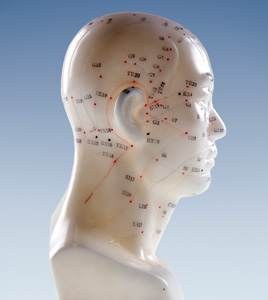
Why does the TCM doctor always put an acupuncture needle in top of head? If you’ve had acupuncture before, it’s likely that your acupuncturist used some acupuncture points on head during your treatments. Using pressure points on the head is something TCM doctors do often, because there are so many useful acupressure points on the head, especially acupuncture points top of head. There are head pressure points for headaches, points to relieve migraines, acupressure head points to help anxiety, fatigue, allergies, and many other conditions.
Even if you’re coming in for acupuncture to help some other condition, whether it’s chronic pain, an autoimmune disease, heart problems, or kidney problems, probably at some point your acupuncture practitioner is going to use acupoints on head to help you relax during your treatment. Every single person who comes into our office for acupuncture is suffering from some form of stress, and using certain points on the top of the head can help with stress relief right away.
Other common reasons to use pressure points in neck and head include:
- to fight fatigue
- headache and migraine
- allergies, asthma, hives, rhinitis, sinus problems, common cold
- anxiety
- nervous disorders
- thyroid disorders
- hormone imbalances
- more mental focus, improved memory and cognition
- tinnitus, ringing in the ears
- vertigo, Meniere’s disease
- toothache, dental pain, dental anxiety
Why are pressure points on the head so powerful? To answer this question, let us explain a bit about the meridian system in TCM.
TCM Meridian Head Points
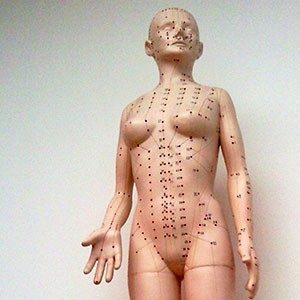
TCM is based on interdependent systems of organs and energy channels that run through the body. The channels are known as meridians, and along them flows Qi, the life energy that animates the body and all of its functions. There are 12 major meridians and 8 major vessels; the meridians are close to the surface of the skin, and the vessels, which essentially connect all the meridians, are deeper inside the body. While the way in which we think of the meridian pathways is more metaphorical than physical in nature, they can be considered roughly analogous to the circulatory system of blood vessels or the network of nerves of the nervous system as we think of them in conventional Western medicine.
Along the meridians lie acupoints, specific points that we stimulate with acupuncture needles during acupuncture treatment or with the fingers and thumbs during acupressure massage. The interconnectedness of the organs, meridians, and individual points is the foundation of acupuncture theory.
We use specific points on a meridian in order to address issues in a particular organ or organ system that corresponds (energetically) with that meridian. There are several pressure points for head and neck pain, points to help relieve allergies, pressure points for frontal headache, and more.
Several of the major meridians originate or end in the head:
- Gall Bladder (GB) meridian – points of the gall bladder meridian wrap around the side of the head, the forehead above the eyebrow, the temple, around the ear, and down the back side of the neck–just as the pain of a migraine often does. Then it continues down from the intersection of the neck and shoulder, zig-zagging across the torso, and finally running down the leg and ending in the fourth toe. This meridian is used to treat severe headaches, stress, tension that affects the shoulder and neck, and bile-related problems.
- Large Intestine (LI) meridian – begins at the points of the index finger, travels up the arm, through the shoulder and neck, then comes up to the lower corner of the nose. This meridian is involved in “letting go,” both from the eliminatory organs of the lower body, and exhalations from the nose.
- Stomach (ST) meridian – the ST meridian starts near the eye, swoops up to the side of the top of the head, comes down next to the mouth, and continues down through the neck, chest, center of the body, down the leg, ending at the point of the second toe. This meridian is used to treat Shen (spirit) disorders, like insomnia, anxiety, palpitations, memory problems, and blood deficiency.
- Small intestine (SI) meridian – originates in the little finger, runs up the arm into the shoulder and then branches out, some of it going into the major organs of the heart, stomach, and small intestine; then other branches go up into the face, by the cheekbone and right in front of the center of the ear. The SI is used to treat fevers and mental health conditions, among other things.
- Bladder (UB) Meridian – begins at the inner canthus of the eyes, goes up and over the top of the head, about an inch away from the midline on either side, and then all the way down the back and leg, ending in the little toe. Used to help with invasion disorders (wind, cold, heat etc.) that affect the eyes, sinus headaches, allergies, stuffy head, neck pain and stiffness.
- Triple burner meridian, also known as San Jiao (SJ) – begins at the tip of the ring finger, then goes up the arm, through the shoulder and chest, up the side of the neck and comes up around the ear, and into the temple and outer brow bone. The San Jiao head points are used to work on dizziness, headaches, eye twitching, and dental pain.
- Conception vessel – also known as the Functional Channel, or the Front Channel, or Ren Mai, this vessel originates at the navel, then drops down to the perineal area, and runs back up the center of the front of the body, ending in a point on the chin, in the dip just under the lower lip. This vessel controls the Yin energy of the body and is essential to the health of the reproductive organs and fertility.
- Governing vessel, also known as the Extraordinary vessel, the “Sea of Yang” or Du Mai – originates in the lower back near the kidneys, runs up the spine and around and over the top of the head, ending in the middle of the face. This vessel controls the Yang energy of the body, and in particular the kidneys, the back and spine.
Top 10 Acupuncture Points on Head
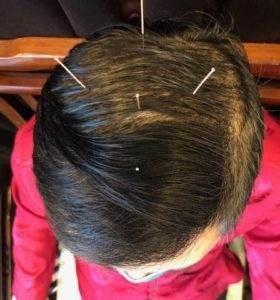
Of course, your acupuncturist will not only use acupoints on your head during a treatment session. We choose a variety of points that will work together to alleviate symptoms and help optimize the functioning of the organs. These specific head points may be used as part of a treatment to work on a specific symptom or condition:
- Yin Tang, or the “Hall of Impression” – this is what is called an “extraordinary point,” meaning it doesn’t really belong to a meridian; it stands on its own. Right in the third eye, it is used to reduce anxiety, vertigo (dizziness), help promote better sleep, clear wind and congestion, and relieve sinus pain and headache.
- DU21 – Shen Ting, “Spirit Court” – Right in the front middle of the top of the head, about an inch above the hairline. This is one of the pressure points for frontal headache, also good for sinusitis, nosebleeds, anxiety, panic attacks, and sleep problems.
- DU 20 – Baihui, or “The meeting of the 100s” – right in the very center of the top of the head, master of endocrine and nervous system, used for anxiety, fatigue, mental focus, relaxation, hypothyroid, adrenal problems, hormone imbalance, headaches.
- Si Shen Chong – “Four Alert Spirit” – this is actually a set of four “extraordinary points,” which surround DU20. Very helpful for sleep disorders, memory disorders, dizziness, and headaches.
- GB20 – Feng Chi, “Wind Pool,” low back of the head, where the skull meets the neck muscles, helps headaches, migraine, blurred vision, fatigue, neck pain and stiffness. We may use this point when a patient has a cold; this is a point where cold wind can get into the body, and why it is important to wear a scarf to protect your neck when it’s cold and windy out.
- Taiyang “Great Sun” – Right in the depression of the temple, this point can help dizziness, one-sided headaches, migraines, sensitivity to light, and jaw pain, TMJ.
- GV26 Shui Gou – in the mustache area, between the nose and mouth, right in the center of the crease, this point helps to calm the mind and restore mental focus. Also used as first aid when a person faints or is in shock. Helps stop hiccups. Helps with serious neurological disorders like epilepsy, seizures. Also good for low back strain.
- LI20 Ying Xiang “Welcome Fragrance” – located in the lower corner of the nose, right in the nasolabial groove, used to alleviate congestion, allergy itching in the nose, and to clear the nasal passages.
- ST8 – Touwei, about 5 finger widths above the eyebrow, dispels dampness, used for “splitting headaches,” frontal headache, migraines, headache with nausea and/or vomiting, vision problems, tearing eyes, eye twitching, dizziness/vertigo, hair loss. Helps with mental health, when a person is “overthinking” things, or having repetitive thoughts.
- BL2 – Zhanzhu – located at the inner corner of the eyebrow, good for itchy, watery eyes due to allergies, other eyes problems like glaucoma, night blindness, and sinus headache.
Facial Acupuncture Points
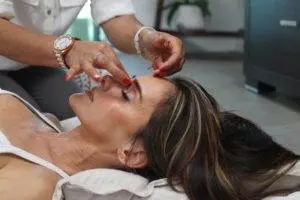
As we have mentioned, some pressure points on the face are used to help relieve sinus congestion, nasal congestion, and other issues related to common colds and flus or allergies. Points on the face may also be used to help the facial paralysis of Bell’s Palsy, or TMJ jaw pain.
Naturally, we also use acupuncture points on the face as acupuncture points for the face, that is, when we are striving for facial rejuvenation. This technique is sometimes called an acupuncture facial. Using points on the face can help to stimulate collagen production, help to tighten the skin, reduce the appearance of wrinkles, and strengthen the facial muscles. People of all ages and genders can benefit from acupuncture skin care. Cosmetic acupuncture can treat signs of aging skin like sagging, puffiness under the eyes, and dryness.
Self-Care With Acupressure Head Points
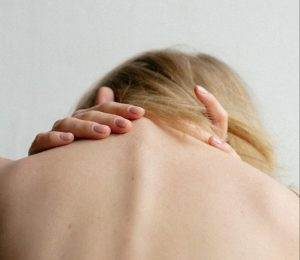
What is acupressure? Acupressure is a form of massage that goes back thousands of years in Chinese Medicine. Stimulating the same points we needle in acupuncture treatment with your fingers and thumbs can be beneficial for different types of headaches and neck stiffness, to calm anxiety, and bring more mental clarity.
Choose a time when your environment is quiet and free of distractions, the same as you would for a meditation practice or home workout. Be sure to breathe deeply and smoothly as you perform self-acupressure. Press firmly, applying deep pressure to a point in a small, gentle circular motion. Giving yourself an acupressure treatment only takes a few minutes, and it is a great way to take care of yourself between acupuncture sessions.
Acupuncture Near Me for Headaches and More
Every time you come in for acupuncture treatment, your TCM doctor is looking for ways to treat your overall condition, but also focusing on how you are feeling right now, today. Often, people are feeling tired and stressed, beyond and in addition to the health condition that caused them to seek out alternative medicine in the first place. Using points on the head that help fatigue, calm a racing mind, and reduce the physical effects of stress is one way that your acupuncturist is practicing preventative care, while at the same time, making sure you leave your treatment feeling rested and reenergized. The next time you come in for a visit, be sure to let us know how you’re feeling, and feel free to ask us, “What is that point on my head for?”
*This article is for education from the perspective of Traditional Chinese Medicine only. The education provided by this article is not approved by FDA to diagnose, prevent, treat and cure human diseases. It should not stop you from consulting with your physician for your medical conditions. Traditional Chinese Medicine is based on Qi, which is an invisible force that usually cannot be observed by modern science. Because science focuses on testing ideas about the natural world with evidence obtained through observation, these aspects of acupuncture can’t be studied by science. Therefore acupuncture and Chinese herbs are often not supported by double-blind, randomized trials, and they are considered alternative medicine therapies in the United States.
How to Stop Snoring With Acupuncture and TCM
By Qineng Tan, L.Ac., Ph.D. & Xiaomei Cai, L.Ac., Ph.D.
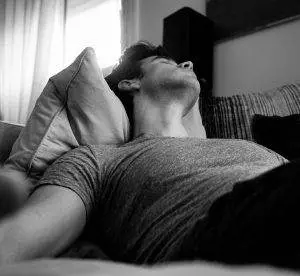
Have you been told you’re snoring loudly? Do you feel tired even after 8 hours of sleep? Waking up with a dry mouth, feeling tired all the time, and having trouble staying asleep at night are all signs that you might have sleep apnea. Sleep apnea is a sleeping disorder in which normal breathing is interrupted repeatedly. Acupuncture and TCM offer a natural way to treat obstructive sleep apnea, insomnia, fatigue, and other sleep-related problems.
Sleep Apnea (also known as sleep apnoea) is when a person does not breathe normally during sleep. When there is a pause in normal breathing during the night, the body is not getting enough oxygen, and the brain sends an urgent message to start breathing again. The person wakes, so briefly that they usually do not remember it, gasps for air and starts breathing again. Often people do not realize that they are snoring or making snorting or choking sounds while they sleep unless another person tells them it’s happening. Because of this, many cases of sleep apnea go undiagnosed, and people go on feeling fatigued all the time.
While people of any age or gender can experience sleep apnea, it is most common among older men. There are a few different kinds of sleep apnea; the most prevalent type is obstructive sleep apnea (OSA), in which the throat and/or airway is physically obstructed by the positioning of the neck, jaw, and soft tissues of the throat, like the tongue and uvula. OSA is associated with being overweight or obese, because extra weight can affect the musculature of the upper respiratory system. Women who have already gone through menopause are more likely to develop sleep apnea because postmenopausal weight gain is more likely to occur in the upper body than it does prior to menopause. Sleep problems and obesity are related in many ways; getting less sleep or poor quality sleep can cause people to gain weight or have trouble losing weight. People with diabetes and/or metabolic syndrome are also at higher risk for obstructive sleep apnea.
Besides disturbing sleep and causing fatigue, apnea can lead to other serious health conditions, especially cardiovascular problems like high blood pressure, irregular heartbeat, and stroke. Sleep apnea can increase the heart rate and the production of stress hormones. Men with OSA are more likely to experience erectile dysfunction (ED). Lack of quality sleep can also have a negative impact on mental health, contributing to depression, anxiety, and cognitive decline.
The typical treatment for snoring involves the use of a sleep apnea machine, called a CPAP machine (continuous positive air pressure machine), which pushes air into the nose while you sleep, ensuring that the airway stays open and continuously active. This treatment can help people breathe easier throughout the night, but some people may find the machine noisy and uncomfortable.
TCM methods like acupuncture treatment for snoring and sleep apnea offer a way to address these problems at their source holistically, helping people to sleep well and breathe more freely.
Top 3 Types of Sleep Apnea
Sleep apnea causes loss of oxygen due to shallow breathing (hypopnea) and/or interrupted breathing while sleeping. Different types of sleep apnea are classified by their physiological causes:
- Obstructive sleep apnea (OSA) – this is caused by the improper relaxation of the throat muscles while sleeping.
- Central sleep apnea (CSA) – is caused by disordered signalling from the brain to the organs that control breathing.
- Complex sleep apnea – (or treatment emergent sleep apnea) is a combination of both of the above.
Restless legs syndrome (RLS), also known as Willis-Ekbom disease, is a condition wherein a person has an uncontrollable urge to move the legs, or sometimes arms or other parts of the body, accompanied by a sensation of itching, burning, crawling or throbbing. This usually happens when the person is lying in bed, trying to fall asleep. Restless leg syndrome can coexist with OSA, compounding the problem by making it difficult to get to sleep or stay asleep during the night.
Narcolepsy is a sleeping disorder in which overwhelming sleepiness during the daytime causes people to suddenly and uncontrollably fall asleep. Many people who suffer from narcolepsy also have sleep apnea. In this case, the sleep problem is not related to breathing so much as how the brain and body are moving through sleep cycles, like REM sleep. For people who have narcolepsy, treatment with a CPAP machine is often not very helpful.
Sleep apnea or snoring does not seem to be related to other abnormal sleeping behaviors (parasomnia), such as sleepwalking, night terrors, or sleep-related eating.
Top 10 Symptoms of Sleep Apnea
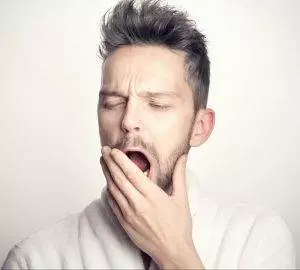
Many people snore and do not realize it. It is important to pay attention to the subtler sleep apnea symptoms. Signs of sleep apnea include:
- Loud snoring
- Interrupted breathing – moments during the night when the person’s breathing actually stops and then starts again
- Gasping for air while sleeping
- Waking up with a dry mouth or sore throat
- Headaches in the morning
- Insomnia, difficulty getting to sleep or staying asleep during the night
- Feeling very sleepy during the daytime (hypersomnia)
- Difficulty paying attention
- Feeling irritable
- Getting up often during the night to urinate (nocturia)
What Causes Snoring?
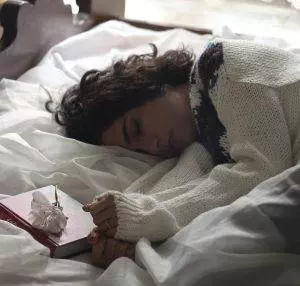
Sleep apnea is caused either by a physical obstruction of the throat and airways or by problems with brain signals to the breathing apparatus. Not everyone who has sleep apnea snores loudly. On the other hand, not everyone who snores necessarily has sleep apnea. Other reasons people snore may include:
- Congestion of the nose due to a cold or allergies
- In late pregnancy, the growing belly puts upward pressure on the respiratory system
- Sleeping pills, medications that work as relaxants, like Ativan or Valium
- Alcohol consumption
- Anatomy – large tongue or uvula, or swollen tonsils
People with sleep apnea are often advised to sleep on their side rather than on their back, as this helps prevent the obstruction, but it can be difficult for people to control their behavior while sleeping.
Treatment for Sleep Apnea
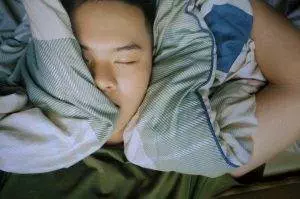
To firmly establish whether a person has sleep apnea, and what type, doctors will often evaluate the situation in a sleep study session. People will spend the night in a sleep center, where their heart and breathing functions are monitored (polysomnography).
CPAP machines are generally considered to be the best care available for sleep apnea. These devices can help stop snoring, allow a person to get more restful sleep, and cut the risks of serious issues like heart disease that are associated with sleep apnea. However, the machine does not actually do anything to improve the weak musculature that causes OSA or the disordered signalling that causes CSA. It is possible to swallow air while breathing with the CPAP machine, which can lead to gas and a bloated stomach. Some people may find the face mask, which must be strapped to the face, uncomfortable. The noise of the machine may be disturbing to the person using it, as well as to the person’s bed partner. It may be difficult for some patients to get used to using the machine, and if they are not using it regularly, they are not getting the health benefits.
There are also some oral appliances available, such as mandibular advancement devices (MAD), which are worn in the mouth to alter the placement of the jaw and tongue in order to keep the airway open during sleep. These can also be effective in terms of helping people breathe better while they sleep. Compared to CPAP, they are quiet, discreet, and cost-effective. Again, the main question is whether a person will be able to tolerate the device; some people may experience toothache or dental pain, TMJ jaw pain, dry mouth, or too much saliva.
Surgery for snoring and sleep apnea is usually only recommended if other methods of treatment have failed. Different procedures involve removing soft tissues (uvula, tonsils, adenoids), or changing the shape of the jaw bones. Small rods may be inserted into the upper palate to help keep the airway open. A device that monitors breathing and stimulates movement of the tongue may be implanted in the chest.
Sometimes people may use melatonin as a natural sleep aid. Melatonin may have a positive impact in terms of helping people fall asleep more easily. It also has strong antioxidant properties, which means it may help with the control of the breathing apparatus and the amount of oxidation a person is getting while sleeping. While it is generally considered safe as a health supplement, melatonin side effects can include problems with dizziness, headaches, and nausea, and it can also be contraindicated with other medications. Melatonin can affect blood coagulation, so it may be unsafe to take if a person is also taking blood thinners, for example.
Can Acupuncture Help Stop Snoring?
According to TCM theory, the spleen and stomach are responsible for transforming nutrients from food and fluids into Qi (life energy), which is then delivered to the heart and lungs. In the TCM view, sleep apnea is often a problem related to phlegm and Qi stagnation, as are many conditions related to fatigue or insomnia. If phlegm builds up and becomes stagnant in the spleen, the lungs cannot get the Qi they need. So, one possible differentiation for sleep apnea is Spleen Deficiency with Qi Stagnation. This condition of dampness and phlegm will often cause people to feel heavy and bloated.
In some cases, too much internal heat contributes to the problem. Snoring, combined with sweating, and waking up with a sore throat, is a sign that we need to clear heat and toxicity from the body.
Sleep disturbed by nightmares is associated with the gallbladder, while difficulty falling asleep is associated with the liver. An acupuncture practitioner will listen carefully to what specific symptoms of sleep apnea each individual patient is experiencing, and tailor the treatment accordingly.
A meta-analysis of over 200 randomized trials involving the use of acupuncture to treat sleep apnea concluded that acupuncture was more effective overall than CPAP treatment, in terms of improving breathing and oxygen levels.
Can Chinese herbs help snoring and sleep apnea? Specific herbs have been shown to help reduce inflammation and improve oxygen levels in patients with sleep apnea. Chinese herbal formulations can help stop snoring and reduce daytime fatigue.
Natural Remedies for Snoring

Acupressure can help snoring and sleep apnea. Since we are trying to clear heat and phlegm from the stomach, spleen, and large intestine, use acupressure points along the Stomach Meridian, which runs down the leg. On the front of the shin, apply pressure, kneading with your thumb, starting to the side of the shin bone a few inches below the knee, then moving down about 3 inches and doing the same thing. Knead each of the four points about 30 times as your move down the leg. If you are aware that one side of the nose is more blocked than the other while you are breathing during the night, practice the acupressure on the opposite leg. For example, if your left nostril is the one that is more stuffed up, do acupressure on the right leg.
Acupuncture Near Me for Snoring
As the population ages, and unfortunately, more people suffer from obesity and metabolic syndrome, sleep apnea is a growing health concern all over the world. Snoring can have a seriously negative impact on quality of life, health, and longevity. Conventional methods of treatment for sleep apnea can be effective, but many people find CPAP uncomfortable and inconvenient for long-term use. If you suspect you may have sleep apnea, or are worried because your partner snores loudly at night and seems to be gasping for air, do not wait to get help. Acupuncture and TCM herbs can help relieve fatigue due to snoring and reduce the risk of more serious problems related to sleep apnea.
*This article is for education from the perspective of Traditional Chinese Medicine only. The education provided by this article is not approved by FDA to diagnose, prevent, treat and cure human diseases. It should not stop you from consulting with your physician for your medical conditions. Traditional Chinese Medicine is based on Qi, which is an invisible force that usually cannot be observed by modern science. Because science focuses on testing ideas about the natural world with evidence obtained through observation, these aspects of acupuncture can’t be studied by science. Therefore acupuncture and Chinese herbs are often not supported by double-blind, randomized trials, and they are considered alternative medicine therapies in the United States.
How To Treat Dizziness With Acupuncture and TCM
By Qineng Tan, L.Ac., Ph.D. & Xiaomei Cai, L.Ac., Ph.D.
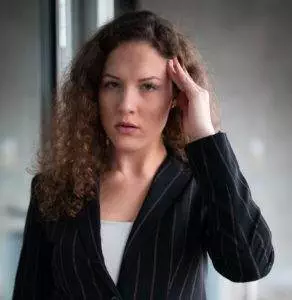
Feeling light-headed and dizzy? Maybe you feel like your head is spinning, or that the world is spinning around you? Headache, nausea, dizziness, and vertigo are symptoms that can be caused by a variety of health problems. Acupuncture and TCM offer vertigo treatment that can help relieve that sense of dizziness and nausea, or feeling light-headed and tired all the time.
Feeling dizzy is one the most common reasons that people go in for a doctor’s visit, or even visit the emergency room. Dizziness is a fairly general term that can mean anything from feeling light-headed, woozy, faint, off-balance, or unsteady to feeling nauseated or like you’re about to pass out.
Vertigo is a specific type of dizziness that refers to a sensation of spinning, as if the room around you is moving. You might feel like you’re leaning to one side, or about to fall over. It can make you feel sick to your stomach, similar to motion sickness. In popular culture, the word “vertigo” is sometimes used to mean a “fear of heights,” but that is actually called “acrophobia.” The sensation of vertigo can be triggered by looking down from above, or looking up at something very tall, but this is not the cause of most episodes of vertigo.
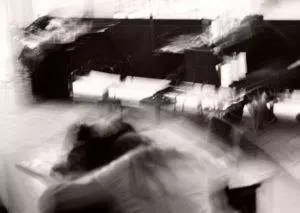
Vertigo causes include migraines and problems with the inner ear. The inner ear and eyes both relay information to the brain about a person’s spatial relation to the environment, so when the functioning of the eyes or ears is disrupted, it can cause a sense of imbalance, and even nausea. Migraine headaches, particularly a specific type called a vestibular migraine, can cause pressure in the head and dizziness and nausea.
Benign paroxysmal positional vertigo (BPPV) is one type of vertigo that causes short-term bouts of sudden dizziness. Benign positional vertigo is caused by the shifting of calcium crystals (canaliths) in the inner ear. This can happen due to a head injury or simply aging.
Other inner ear problems that can cause signs of vertigo include Meniere’s disease and Labyrinthitis. Meniere’s disease is a chronic disorder related to abnormal amounts of fluid (endolymph) collecting in the inner ear. The exact cause of Meniere’s is unknown, but it develops more frequently later in life. Meniere’s disease causes attacks of vertigo that can last from a few hours up to 24 hours. Like migraines with an aura, there is often a period of time during which a set of “warning symptoms” begin to occur, such as: a feeling of uneasiness, being off-balance, headache and dizziness, queasiness, hearing loss or ringing in the ears, or extra sensitivity to sound. Once an attack of vertigo hits, it can be quite severe, causing intense pressure in the ear, blurred vision, vomiting or diarrhea, cold sweats, rapid heart rate, and feelings of fear and panic. There is currently no cure for Meniere’s.
Labyrinthitis refers to inflammation of the small parts of the inner ear, or around the nerves of the inner ear that can be caused by viral or bacterial infections, such as: a flu, measles, herpes, hepatitis, Epstein-Barr, chicken pox, or childhood ear infections. Symptoms of labyrinthitis can include: dizziness, nausea, tinnitus (ringing in the ears), and difficulty concentrating.
Lightheadedness is a similar sensation to dizziness in some ways, but is usually caused by a sudden change in blood pressure or the flow of blood to the head. You have probably experienced feeling light headed and dizzy when you get up too fast from sitting or lying down. Other causes of lightheadedness include: allergies, anxiety, anemia, hyperventilating, arrhythmia, or heavy bleeding (as during menstruation).
Dizzy spells happen to everyone once in a while. But recurrent headache and dizziness should be addressed. Acupuncture and TCM have been used to help dizziness for thousands of years and offer natural solutions to the underlying causes of vertigo.
Top 10 Causes of Dizziness

Feeling light headed and dizzy, or having headache, nausea, dizziness, can occur as symptoms of a variety of imbalances. Reasons for dizziness may include:
- Inner ear imbalance, or labyrinthitis
- Meniere’s disease
- Sleep apnea, snoring
- Migraine – vestibular migraine
- Dehydration – alcohol, diuretics
- Sinus issues
- Ear infection
- Low Blood Sugar – diabetes, hypoglycemia
- Multiple Sclerosis (MS)
- Prescription Medication side effects
Dizzy spells that occur first thing in the morning are common for some people. This can be simply due to the change in pressure in the ear when you get out of bed. Waking up dizzy due to sleep apnea occurs because this condition obstructs your breathing during the night, and you may have lower oxygen levels when you wake up. Being dehydrated is another common cause of dizziness, which is exacerbated by drinking alcohol before bed. In general, drinking too much caffeine, too much alcohol, and not enough water, or taking diuretics can all lead to dizzy spells. Low blood sugar, whether due to diabetes, or simply not eating regularly enough, can also be a cause of light-headedness. Hepatitis, HBV, or HCV can also cause dizziness.
Postural orthostatic tachycardia syndrome (POTS) causes dizziness when moving from a seated or position or lying down to standing up.
Cervical vertigo, or cervicogenic dizziness, is another type of vertigo caused by the positioning of the neck or cervical spine; in this case, the feelings of imbalance and spinning may be accompanied by neck pain. This type of vertigo may happen, for instance, after a whiplash injury.
Treatment for Vertigo
The medical treatment for dizziness and vertigo depends wholly on the underlying causes for the symptoms. If a bacterial infection in the ear is confirmed, then antibiotics may be used. In cases of BPPV, a canalith repositioning procedure (CRP) is a non-invasive technique that can help the crystals within the inner ear move back into their proper place. Migraine-related vertigo may be treated with the medications typically prescribed for migraines. Anti-nausea drugs like Dramamine may be suggested. Patients suffering from cervical vertigo may be referred to physical therapy to help improve the positioning and strength of their neck/cervical spine.
Can Acupuncture Help Dizziness?
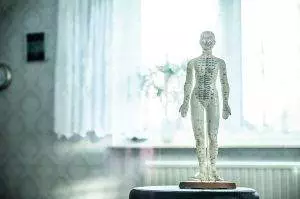
One of the central concepts of TCM is that of the root and the branches. The branches are the visible, outward signs or symptoms of a problem, while the root refers to what is going on deeper in the organ systems of the body. In the cases of dizziness and vertigo, there is deficiency in the root and excess in the branches.
Pathogenic factors involved in dizziness and vertigo are phlegm, wind, fire, and deficient Qi. When there is weakness in organs like the spleen, stomach, kidney, or heart, pathogens like wind, heat, and phlegm can take hold. The San Jiao, also known as the “triple burner,” is another important concept in TCM; one of its primary functions is to control the movements of fluids in the body so that they don’t collect and build up inappropriately. In case of vertigo, phlegm and heat develop to the point of causing stagnation and malfunctioning of the Jiao, pushing phlegm upwards in the body. An acupuncture practitioner will carefully listen and observe to discover which organ systems are out of balance, and work to strengthen those areas. For example, dizziness combined with emotional disturbances like anger and depression is a sign of too much wind or heat in the Liver. Weakness in the heart or spleen may follow a long illness or period of stress and anxiety. Too much phlegm, heat, and dampness in the stomach and spleen can result from an improper diet and too much stress.
Acupuncture and herbs to tonify these organs and clear heat and phlegm will take care of the root of the dizziness. Meanwhile, specific acupuncture points can have an almost immediate effect at relieving immediate discomfort, facilitating a natural vertigo cure.
A study conducted at a hospital in Taiwan used acupuncture to treat patients with dizziness and vertigo. The findings conclusively showed immediate improvement in symptoms.
A study of 60 patients who were admitted to an emergency room suffering from vertigo from a variety of causes, including Meniere’s and BPPV, showed that acupuncture treatment provided immediate relief of symptoms and is therefore a good alternative for dizziness due to various causes.
Top 5 Tips to Get Rid of Dizziness
Depending on the cause of the vertigo, there are different ways to manage with TCM techniques, including vertigo exercises, acupressure for dizziness, moxibustion, and foods to avoid.
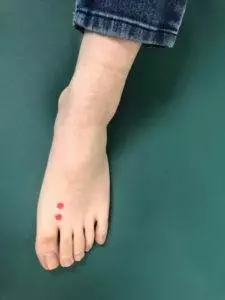
Major 4 types of Vertigo/Dizziness presentation:
- Hypertension type – When a person has high blood pressure, too much liver yang, and is overheated, it can cause dizziness. For this, we use acupressure Liver points 2 and 3 on the toes.
- Qi and Blood deficiency – if a person shows signs of anemia, or has heavy periods, hemoglobin is low, or if a person has chronic conditions, or has suffered a major injury, or recently given birth, experienced major blood loss. For this we want to ensure a good diet with plenty of soups and easy to digest foods. Moxa on the back can help to strengthen the body’s Qi and produce enough blood. Qi Gong exercise of squeezing the earlobes and outer ear up and down is helpful.
- Kidney essence deficiency – this could be due to some constitutional weakness, or due to old age, or someone who tends to have chronic illness, diarrhea. The kidney essence can’t support rising essence to the head. For this, acupressure for Kidney 1 – on the bottom of the foot.
- Phlegm stagnation – when the middle jiao is not working due to stagnation of phlegm creating blockage so Qi cannot ascend. This happens when people are overweight, or have poor digestion, diarrhea. Avoid dairy and fried foods, which encourage phlegm. Moxibustion treatment to the back is helpful, and applying pressure to Stomach-36 acupressure point can help the middle jiao open up.
- Neck Pain – if a neck problem is causing a blockage, due to a neck disease or bulging disc, unhealthy cervical disks, compression, tension, and muscle spasms can block upwards energy. Exercises to encourage the health of the neck discs, loosen up the muscles and allow flow of Qi and blood up to the head. Your acupuncture practitioner will recommend neck exercises to help with this.
Acupuncture Near Me for Dizziness
Vertigo and dizziness may not be life-threatening symptoms, but they can have a big impact on your daily life. Frequently being blindsided by unexpected dizziness, spinning sensations, nausea, and headaches is unsettling and debilitating. Medications can be helpful in some cases, but they can also cause unwanted side effects. Getting to the root cause of vertigo with acupuncture and TCM will help get rid of dizzy spells so they don’t keep coming back.
*This article is for education from the perspective of Traditional Chinese Medicine only. The education provided by this article is not approved by FDA to diagnose, prevent, treat and cure human diseases. It should not stop you from consulting with your physician for your medical conditions. Traditional Chinese Medicine is based on Qi, which is an invisible force that usually cannot be observed by modern science. Because science focuses on testing ideas about the natural world with evidence obtained through observation, these aspects of acupuncture can’t be studied by science. Therefore acupuncture and Chinese herbs are often not supported by double-blind, randomized trials, and they are considered alternative medicine therapies in the United States.
How to Treat Morning Sickness With Acupuncture and TCM
By Xiaomei Cai, L.Ac., Ph.D. & Qineng Tan, L.Ac., Ph.D.

Nausea or vomiting during the first few months of pregnancy, known as “morning sickness,” is experienced by more than half of all pregnant women. Severe nausea and vomiting, or morning sickness that lasts all day or further into pregnancy–called Hyperemesis Gravidarum—is less common, but can cause health problems for both the mother and the developing fetus. Acupuncture and TCM provide a natural and effective alternative for dealing with both mild and severe morning sickness.
“Morning sickness” is somewhat of a misnomer, although nausea during the first several weeks of pregnancy is often experienced early in the day, before eating. Having an empty stomach can exacerbate the queasy feeling of morning sickness. But why is it called morning sickness when it lasts all day? As many women know, morning sickness can strike at any time of day or night, and some women feel nauseous throughout the day.
The majority (at least 70%, maybe more) of all pregnant women experience some nausea during early pregnancy. Morning sickness usually begins occurring when a woman is around 6 weeks pregnant, and goes away by about the 12th week of pregnancy, or the transition into the second trimester. However, some women will continue to feel morning sickness later in pregnancy.
Medical science has not determined exactly what causes morning sickness, although it is generally thought to be related to changes in hormones, particularly an increase in hCG, known as the “pregnancy hormone.” A recent research study found that a specific genetic sequence present in some women may account for increased nausea during pregnancy. Some researchers at Cornell University have posited that morning sickness may be an evolutionary development that prevents harm to babies in utero by keeping the mother’s diet free of potentially toxic substances. They observed that in cultures where the staple diet relies more on starches and less on meat, pregnant women were less likely to experience morning sickness.
For most women, the morning sickness that occurs in the early months of pregnancy is not dangerous to their health or that of the fetus. However, feeling nauseous a lot of time is certainly uncomfortable. Some lifestyle habits can help get the nausea and vomiting under control. Acupuncture treatment and herbs can help even more to provide relief from the daily nausea of morning sickness.
For some women, morning sickness is more than just a nuisance. Not being able to keep any food down and vomiting repeatedly throughout the day for weeks or even months on end can cause serious health issues for mom and baby. Lack of proper nutrition, dehydration, and weight loss can lead to unwanted outcomes later on, including pre-term delivery and low birth weight of the infant. Hyperemesis gravidarum requires treatment. Acupuncture help for morning sickness is a natural alternative to drugs used to treat nausea.
Top 5 Symptoms of Morning Sickness
The symptom of nausea during early pregnancy is often what first lets a woman know she might be pregnant. Feeling queasy, dizzy, sensitive to smells, an aversion to certain foods, and occasionally vomiting are the most common signs of morning sickness. The sensations can be likened to those of motion sickness, or having a hangover. Many women report having a metallic taste in their mouth, and/or more saliva, which can contribute to feeling nauseated.
Severe morning sickness is a more serious problem. Signs of hyperemesis gravidarum include:
- Vomiting 3-4 times per day or more
- Feeling light-headed or dizzy after vomiting
- Dehydration: thirst, dry mouth, not having to urinate normally
- Heart beating fast, heart palpitations
- Losing weight during pregnancy (more than 10 pounds)
Some women may be at higher risk for hyperemesis gravidarum if they are: having multiples (twins or triplets), if their mother also had severe morning sickness (genetics), or if they generally tend to have a more sensitive stomach, even when not pregnant. Stress, lack of sleep, and hot weather can all trigger more nausea during pregnancy.
Medical Treatment for Morning Sickness
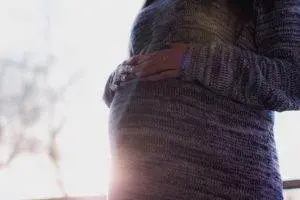
Nausea and vomiting during pregnancy is challenging to treat effectively, as care must be taken to avoid drugs that could harm the mother or the developing fetus. Often women are not treated for severe morning sickness until they have become so sick and dehydrated from vomiting that they need urgent care. At this point, a woman may need to be hospitalized and treated intravenously for dehydration.
There has been a somewhat standard practice of people recommending and using over-the-counter antihistamines or antiemetics like Pepto-Bismol to help quell nausea. In a 6-year study of women with hyperemesis gravidarum, researchers found that women who had used medications like Benadryl during pregnancy were more likely to experience adverse outcomes. A combination of vitamin B-6 and doxylamine is sometimes recommended. This drug combination is sold as an OTC sleep aid. Phenothiazine is sometimes prescribed for women with morning sickness, but it’s efficacy and safety for this use has not been studied extensively.
These medicines are used because they seem relatively risk-free, but they still carry the risk of side effects, like drowsiness, headaches, dry mouth, etc. In many cases, they are not totally effective. Acupuncture and TCM herbal formulations offer relief from nausea and other pregnancy issues without any negative side effects.
How Can Acupuncture Treat Nausea?
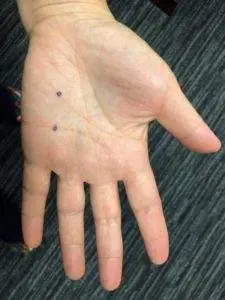
According to TCM, Qi (life force energy) moves through the body along meridians, channels that connect the organ systems. The Chong meridian connects the reproductive organs to the brain and the heart. This particular energy channel is related to all concerns having to do with female reproductive health and gynecological conditions, including menstruation and pregnancy. Its relation to the heart means that it is also connected to feelings of anxiety, panic attacks, and palpitations.
Each woman’s experience of morning sickness is different, so a TCM practitioner will look carefully at each individual patient to determine the specific imbalances causing the nausea and address them appropriately with acupuncture and herbs.
In TCM theory, morning sickness and hyperemesis gravidarum are related to the stomach, spleen, and liver. When a woman becomes pregnant, blood and Qi are strongly directed towards the pelvic area to nourish the womb (uterus) and the developing fetus. This surge of energy will also affect the digestive organs, potentially causing stomach problems. This is more likely to happen to women who have had weak digestion previously, perhaps due to a lack of proper functioning of the spleen. Likewise, the direction of more blood to the reproductive organs can cause a decrease in Yin energy in the Liver, thus increasing Yang energy. Liver fire can also trigger imbalance in the Stomach, leading to nausea and vomiting.
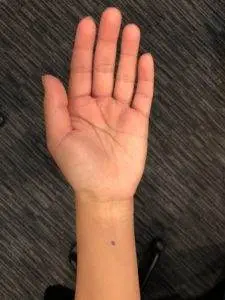
A specific acupressure/acupuncture point on the wrist is especially helpful for reducing nausea. This acupoint is known as PC6, or Nei Guan, 内关, which translates as “Inner Pass.” You may have seen special bracelets or wristbands recommended to help reduce nausea due to morning sickness (or motion sickness or postoperative nausea related to opioid medications). These products are designed to stimulate this acupressure point for nausea. While applying gentle pressure to this point can certainly be beneficial for women experiencing morning sickness, acupuncture treatment that includes this point and others is even more effective.
A systematic review of published studies related to the use of PC6 stimulation for nausea and vomiting found that this treatment produces clinically effective results, not only for pregnant women, but also for patients in cancer treatment and other people experiencing severe nausea.
A randomized trial conducted in Sweden to study the use of acupuncture treatment in conjunction with standard medical treatment for women with hyperemesis gravidarum found that acupuncture was not only very safe and free of side effects, but that women who received acupuncture were able to get over their severe nausea and vomiting more quickly than women getting only the standard treatment.
A study conducted at a maternity hospital in Australia compared women who received acupuncture for morning sickness to groups receiving placebo treatment or no treatment. The women who received acupuncture reported significantly less nausea and retching.
Top 5 Tips to Help Morning Sickness

Naturally, pregnancy is a time to embrace new lifestyle habits that are beneficial to both mother and baby. Eating a healthy diet during pregnancy can be especially difficult if you are feeling nauseous. Getting enough nutrition and rest during pregnancy is vital.
- Eat plain, “bland,” warm foods. Avoid anything that is spicy, salty, fatty, fried, or cold.
- Eat smaller meals/snacks at regular intervals throughout the day, so as to avoid the stomach being empty or too full, and to keep blood sugar levels steady.
- Sip water slowly and regularly. Don’t gulp down large amounts of liquid all at once.
- Sip ginger tea, made by steeping a few slices of fresh ginger.
- Actively prioritize stress reduction. Anxiety can exacerbate the nausea of morning sickness. Take frequent rest breaks. Ask your TCM provider to show you some gentle meditative exercises like Tai Qi or Chi Gong that can help relieve stress and nausea.
Talking with a trusted healthcare professional who understands what you’re going through can be helpful for calming anxieties about your pregnancy. Finding an experienced acupuncturist who can help you through any and all of the symptoms and worries that may come up during pregnancy, birth, and postpartum care can help to ease stress and discomfort.
Acupuncture Near Me for Morning Sickness
Acupuncture is an excellent modality not only for helping to relieve nausea due to morning sickness; TCM is a holistic form of medicine that can help women throughout pregnancy. Many discomforts and concerns may come up as a woman anticipates birth. Working with an integrative health provider who has a thorough understanding of gynecology and obstetrics from both Eastern and Western medical points of view can be beneficial to the physical and emotional health of both mother and baby. At Art of Wellness, we have over 30 years of experience helping women attain better reproductive health: from painful periods, to fertility issues, through pregnancy, postpartum, and menopause.
*This article is for education from the perspective of Traditional Chinese Medicine only. The education provided by this article is not approved by FDA to diagnose, prevent, treat and cure human diseases. It should not stop you from consulting with your physician for your medical conditions. Traditional Chinese Medicine is based on Qi, which is an invisible force that usually cannot be observed by modern science. Because science focuses on testing ideas about the natural world with evidence obtained through observation, these aspects of acupuncture can’t be studied by science. Therefore acupuncture and Chinese herbs are often not supported by double-blind, randomized trials, and they are considered alternative medicine therapies in the United States.
How To Treat Amnesia With Acupuncture and TCM
By Qineng Tan, L.Ac., Ph.D. & Xiaomei Cai, L.Ac., Ph.D.
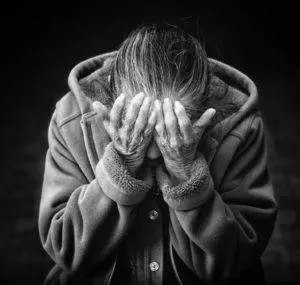
Are you experiencing unusual forgetfulness? Amnesia due to an injury or a brain disease like Alzheimer’s can cause loss of memory. TCM and acupuncture offer an alternative treatment for problems with memory loss due to different types of amnesia or dementia related to brain diseases like Alzheimer’s or Parkinson’s.
Amnesia is often depicted in stories as the sudden loss of one’s memory, or even their whole identity, due to a traumatic accident of some sort. That kind of dramatic memory loss is rare in real life. Difficulty remembering events from one’s past is called retrograde amnesia. The most common type of amnesia, however, is anterograde amnesia, which causes short-term memory problems. People with anterograde amnesia may be able to remember facts they learned in school, and how to do things like play a sport or an instrument, but they have trouble remembering what they did earlier this morning, or what day of the week it is. Anterograde amnesia can have a serious impact on a person’s life, as it can make it difficult to retain new information, learn new skills, or form relationships with new people.
Conditions like Alzheimer’s and Parkinson’s can affect memory and cause other types of cognitive impairment. Memory problems can be a part of dementia; the term “dementia” encompasses other kinds of cognitive decline in addition to memory loss. Being more forgetful is considered a common aspect of mild cognitive impairment (MCI). MCI is the term for changes in thinking patterns that occur in older adults, sometimes as a precursor to more serious dementia. “Amnestic MCI” pertains to short-term memory problems like forgetting recent events, appointments, and facts or names one might have been able to call up easily in the past.
People suffering from depression and/or anxiety, and those with PTSD often experience short-term memory loss, forgetfulness, or a sense of confusion.
At this point, there is no real medical solution for amnesia or other kinds of memory loss. There are no treatments that cure or reverse dementia or Alzheimer’s. Medications like cholinesterase inhibitors and memantine may help to slow the breakdown of certain neurotransmitters–brain chemicals that relate to memory and learning capacity. Cognitive therapy can help people work on their memory skills and teach them coping mechanisms, like using various forms of reminders and creating stable routines that help them continue to perform their daily tasks.
Research has shown that TCM and acupuncture treatment have a positive impact on cognitive impairment, as measured both by memory assessments, as well as the impact on neurotransmitter activity in the brain.
Top 5 Types of Amnesia
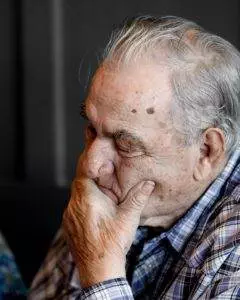
Amnesia is classified into two main categories: neurological amnesia and functional amnesia. Neurological amnesia is caused by some type of physical problem with the brain, either due to an injury, a stroke, a tumor, or diseases like Alzheimer’s and Parkinson’s. Amnesia could also result from an infection that affects the brain, such as HIV, Lyme disease, or encephalitis. Functional amnesia is caused by some psychologically damaging event that causes a person to “block out” memories. This type of amnesia is considered a psychiatric disorder.
- Retrograde amnesia – this type of amnesia occurs after a traumatic event or injury to the brain. It affects memories that were stored before the inciting event, but not necessarily the entire history of memories. Usually the events leading up the trauma are the ones that are compromised.
- Anterograde amnesia – this type of amnesia causes short-term memory loss. While a person can still pay attention, they have trouble retaining new information or forming new memories related to current events.
- Transient global amnesia – this type of amnesia incorporates both retrograde and anterograde types of memory loss, but only for a short period of time (anywhere from a few to 24 hours). This temporary loss of memory usually occurs in older people, perhaps because of some loss of blood flow to the brain (ischemia) or loss of oxygen to the brain (hypoxia), or even because of a seizure.
- Dissociative amnesia – a mental health disorder in which a person blocks out memories or certain facts about their life after an emotionally traumatic event. This is sometimes known as “selective amnesia.”
- Infantile amnesia – (or childhood amnesia) this term refers to the fact that most people do not have memories from the early years of their life.
Other factors that can affect memory to the extent that they cause amnesia are severe alcoholism (when a person gets “blackout drunk” and cannot remember what has happened), severe nutritional deficiencies, thyroid issues, or exposure to radiation. Some drugs, like benzodiazepines, or anti-epileptic medications, can cause memory loss while the drug is in effect. Electroconvulsive Therapy (ECT) is sometimes used in psychiatric treatment to induce selective amnesia.
Sometimes amnesia is temporary, such as after an injury. Once the brain heals, memory will often be restored. Amnesia due to brain damage, such as after a stroke, may be permanent, while amnesia caused by a degenerative disease like Alzheimer’s, may be progressive in nature. Acupuncture treatment can be beneficial for people with various types of memory loss, both by helping people heal after brain trauma, and helping to protect the brain and other organs from degeneration due to aging or other kinds of disease.
Can Acupuncture Help Amnesia?

TCM theory takes a different view of the organ systems of the body than conventional modern medicine does. Whereas memory loss, cognitive impairment, amnesia, and dementia are seen as primarily having to do with the brain, in TCM we see problems with memory and cognition as also being related to the function of the kidneys, liver, spleen, and heart. The kidneys, in particular, are believed to support the brain, so if the kidneys are weak, or congested with phlegm, this can lead to amnesia. The buildup of phlegm in the body can block the smooth flow of qi and blood, leading to a lack of nourishment to the brain. It can also block the channels of communication between the heart and the brain. This concept of phlegm is roughly analogous to the conventional medical view of how heart disease arises from the buildup of cholesterol clogging the arteries. TCM treatment for amnesia and dementia will often focus, then, on the clearing of phlegm from the channels, and working to resolve other conditions, like high blood pressure or diabetes, that are contributing to the problems of memory loss and cognitive deficits.
Herbs have been used for many centuries in TCM to help improve memory function and stave off cognitive decline. In recent years, scientific research has begun to confirm that these herbs can work to reduce neurodegeneration. TCM herbal formulations have the benefit of being highly customizable, while being relatively free of potential negative side effects. Acupuncture has been demonstrated to help patients recover neurological function after traumatic brain injuries.
Top 5 Tips for Improving Your Memory With TCM
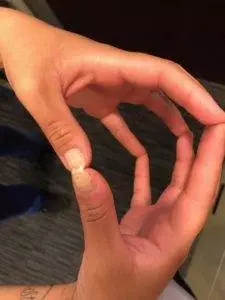
Stimulating more blood flow to the brain can help boost your memory. Try these simple home remedies to help promote better cognitive function.
- Acupressure Points for Memory – Find the tender spot right in the center of the top of the head. Stimulate this point, and the four points that can be found one inch away from the center in each direction: right, left, front, and back (see photo above). Apply gentle but deep, downward pressure with your finger to each of these five points 50-60 times each day.
- Stimulate the Fingertips and Tips of the Toes – Hold the hands so that the tips of the fingers and thumbs touch. Gently press or stroke the corresponding fingers together, each stimulating the other, up to a hundred times. Practice daily. Similarly, gently press/stroke the tip of each toe, up to a hundred times per day.
- Keep the Neck Supported – when the neck is stiff or out of alignment, blood flow to the head and brain may be compromised. If you have neck pain or tightness, be sure to address it adequately with acupuncture, a supportive pillow and appropriate sleeping position, and gentle exercise.
- Dry Brush the Scalp – use a brush or comb to stimulate the whole scalp every day. This will help bring good blood flow to the head.
- Massage the Ears – gently knead the whole outer ear, especially the ear lobe, until it is warm and red. This will stimulate many beneficial acupressure points located on the ear.
Acupuncture Near Me for Memory Loss
Perhaps someone close to you has begun to show worrying signs of cognitive decline or loss of memory. People who are suffering from amnesia and dementia associated with degenerative brain diseases like Alzheimer’s can benefit from an integrative approach that includes acupuncture and herbs.
*This article is for education from the perspective of Traditional Chinese Medicine only. The education provided by this article is not approved by FDA to diagnose, prevent, treat and cure human diseases. It should not stop you from consulting with your physician for your medical conditions. Traditional Chinese Medicine is based on Qi, which is an invisible force that usually cannot be observed by modern science. Because science focuses on testing ideas about the natural world with evidence obtained through observation, these aspects of acupuncture can’t be studied by science. Therefore acupuncture and Chinese herbs are often not supported by double-blind, randomized trials, and they are considered alternative medicine therapies in the United States.